A Band Called Death Blu-ray Movie
HomeA Band Called Death Blu-ray Movie 
Blu-ray + Digital CopyImage Entertainment | 2012 | 96 min | Not rated | Aug 13, 2013
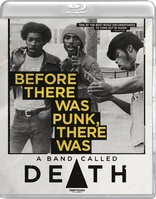
Movie rating
7.5 | / 10 |
Blu-ray rating
| Users | 0.0 | |
| Reviewer | 4.5 | |
| Overall | 4.5 |
Overview
A Band Called Death (2012)
A documentary on the 1970s protopunk trio Death, and their new-found popularity decades after they disbanded.
Starring: Bobby Hackney, Sr., Dannis Hackney, David Hackney, Bobbie Duncan, Kid RockDirector: Mark Christopher Covino, Jeff Howlett
| Documentary | 100% |
Specifications
Video
Video codec: MPEG-4 AVC
Video resolution: 1080p
Aspect ratio: 1.78:1
Original aspect ratio: 1.85:1
Audio
English: DTS-HD Master Audio 5.1 (48kHz, 16-bit)
English: Dolby Digital 5.1 (448 kbps)
Subtitles
English SDH
Discs
50GB Blu-ray Disc
Single disc (1 BD)
Digital copy (as download)
Playback
Region A (locked)
Review
Rating summary
| Movie | 4.5 | |
| Video | 4.0 | |
| Audio | 4.0 | |
| Extras | 4.5 | |
| Overall | 4.5 |
A Band Called Death Blu-ray Movie Review
Belated Acclaim
Reviewed by Michael Reuben August 13, 2013The history recounted in A Band Called Death is so remarkable that no one would believe it if it were told as fiction. In 1971, fives years before the Ramones' debut album, three brothers from Detroit formed a band that their leader, the eldest of the three and the group's guitarist, would later christen "Death". Despite being African-American and being raised in the home of Motown, they evolved away from soul music and funk to embrace their own version of hard rock in a style that, as the decade wore on, would be heard everywhere under the label "punk". But the world never heard Death's music during the heyday of punk. The band was offered a recording contract in 1974 but only on condition that it change its name. Their leader, David Hackney, refused, and Death's career was over before it started. The Hackney brothers went on with their lives. The younger two, Dannis (with an "a") and Bobby, relocated to Vermont, founded a reggae band and held down jobs. Bobby Hackney started a family. David tried life in Vermont but returned to Detroit where he married. Frustrated in his creative endeavors, he drifted into alcohol abuse. He died of lung cancer in 2000. The band called Death would have been forgotten, except that one 7" single, "Politicians in My Eyes", had been pressed as a demo, and copies surfaced occasionally in the collectors' market. Courtesy of the digital age, MP3s of Death songs circulated widely enough to capture the attention of rock critics and fans. By this time, Bobby Hackney's sons were old enough to have become musicians in their own right, taking their late uncle's nickname "Rough Francis" as the name of their band. One day, Julian Hackney followed a friend's tip to a web posting of "Politicians in My Eyes" and immediately recognized his father's voice. Thus emerged a long-buried chapter of family history, as the next generation discovered and began to perform the songs their father and uncles had put away over three decades earlier. It turned out that Bobby Hackney still had the master recordings that were almost released in the Seventies. David had consigned the masters to the care of his brothers not long before his death, telling them to keep the tapes "until the time was right". The time was now right for Death to be reborn. Filmmakers Jeff Howlett and Mark Covino were there to document the process, having met members of the Hackney family in the Nineties. A Band Called Death is the result of four years of interviews and research through archives, family albums and old video, attempting to reconstruct the history of a band that waited thirty-five years for its time in the spotlight
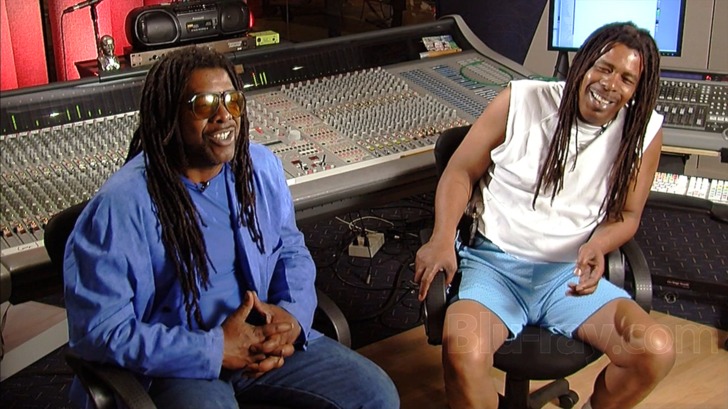
Some of the publicity for A Band Called Death (hereafter, "ABCD") conveys the impression that the film rewrites rock history, but that is not what Howlett and Covino have accomplished. The Hackneys' music is a remarkable achievement, but it exists in a separate world outside the development of rock music in the late 20th Century, because almost no one heard it until the 21st. The story of ABCD is much more a personal story of a family's faith across the years. As befits a family saga, most of the film is narrated by the elder Hackneys: Dannis, Bobby and the fourth and oldest brother, Earl, Jr., who didn't play in the band but had to suffer through the din during the 3-6pm sessions that their mother allotted for practice at home. They are joined by David's widow, Heidi, and later Bobby's sons, Urian, Julian and Bobby, Jr. Various industry figures are interviewed who knew the Hackneys back in the day, as well as a number of contemporary critics and collectors, and familiar faces from the rock scene such as Alice Cooper and Kid Rock. ABCD doesn't try to make a case for the quality of Death's music. The demand that led to the release of their two albums to date has already done so ( . . . For the Whole World to See in 2009 and Spiritual/Mental/Physical in 2011). The film is the story behind the music. The family theme begins with the brothers' father, Earl, Sr., a part-time preacher and electrical line worker, summoning them to watch the Beatles' first appearance on The Ed Sullivan Show in 1964, which is what inspired David Hackney to learn the guitar and started the brothers on their path as musicians. It was their father's untimely death in a traffic accident in 1973 that prompted David to rename the band from "Rock Fire Funk Express" to Death. His notion, as Bobby explains several times in ABCD, was to spin a negative into a postive, and one gets the sense that David's brothers accepted the idea more on faith than understanding. Much later, after David's passing and the rediscovery of Death's music, the idea makes more sense to them. "It's like a movie", Bobby says at one point. "And we are the unwitting stars of the movie. And Dave is the director. Even from his grave, he's directing the movie!" As ABCD tracks the progress of Death's revival, its recruitment of new guitarist Bobbie Duncan and its joint appearances with Rough Francis, Howlett and Covino take the time to fill in some background on the brothers' lives in the intervening years, especially Bobby, Sr. He put three kids through St. Michael's College by working on the school's maintenance crew, all the while performing with Dannis in a successful reggae band called Lambsbread. At no point in any of his or Dannis' interviews (or in the accompanying commentary) is there a hint of regret at what might have been if, thirty-five years ago, they had persuaded their brother to change the band's name and accepted the recording contract offered them by Clive Davis of Columbia Records. There's no energy wasted on speculation over lost opportunities for fame and fortune. One gets the sense that these men don't care about such things. "Family", says Bobby at one point, "is everything to us." Consistent with this theme, Howlett and Covino have structured ABCD so that the film climaxes not with a concert but with a funeral, that of the Hackneys' mother, Majora Florida. She lived long enough to see her son David's dream come true, as the band Death was reborn. (In a brief scene early in the film where she appears, obviously frail but still lively, she says that the family has been talking a lot about David.) Howlett and Covino reveal on the commentary track that they were reluctant to bring their cameras to the funeral but that Bobby and Dannis Hackney insisted. Watching the footage, one gains a privileged insight into the special bonds that unite this remarkable family raised by a Baptist minister and a devoted mother. There are tears at Mrs. Hackney's service, but it is not a heavy occasion. Bobby Hackney's eulogy is greeted with applause for a life well lived. As David understood when he chose his band's name, this family does not view death as a separation. The body may have left this world, but the spirit remains.
A Band Called Death Blu-ray Movie, Video Quality 
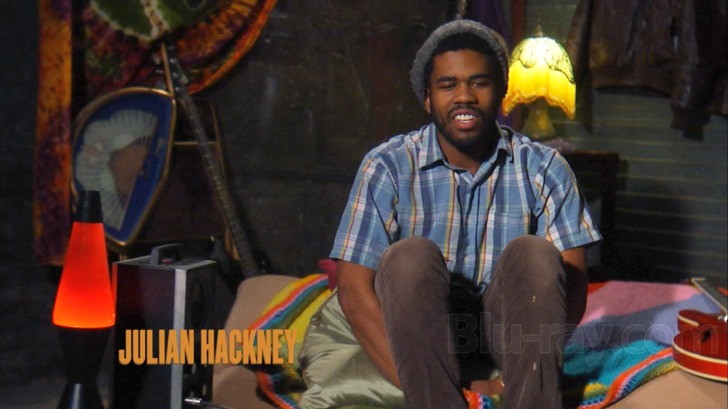
Although several different camera operators photographed A Band Called Death (including the Hackneys with handheld cameras), director Covino is the film's credited cinematographer. Like many documentaries, ABCD was assembled from diverse sources, including old VHS tapes, photographs scanned and "separated" so that individual figures could be emphasized, archival footage and, of course, contemporary interviews shot digitally. The result, edited together and presented by Drafthouse Films on a 1080p, AVC-encoded Blu-ray, is a pleasure to watch, because the directors have used all the available tools to get the viewer close to their subjects, and the Blu-ray reproduces every detail. The contemporary footage is smooth, sharp and detailed, so that every flicker of expression (and every tear) registers, as the Hackneys relive and remember. Older material has been processed with care to extract all available resolution from these sources. This is an exemplary treatment of a documentary presentation and a fine example of why such films deserve to be seen on Blu-ray.
A Band Called Death Blu-ray Movie, Audio Quality 
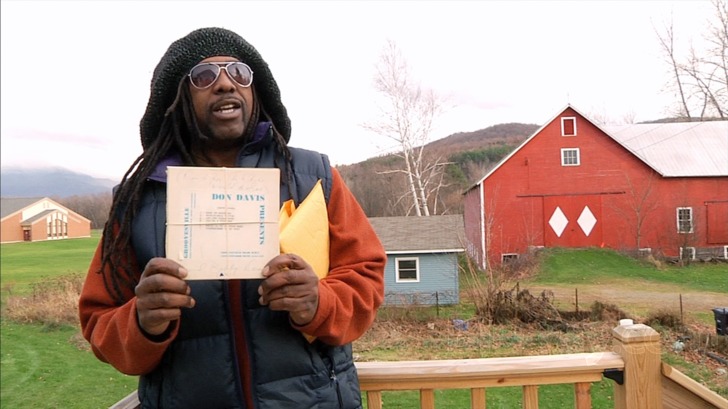
A Band Called Death has an elegantly mixed (by Skywalker Sound) lossless DTS-HD MA 5.1 track with original scoring by Tim Boland and Sam Retzer (Stomp the Yard), but documentaries are rarely sonic showcases. There are only a few short scenes of live performance, since the film's focus is almost entirely on reconstructing events long past and on recent developments that led to the band's rediscovery. The most important elements of the soundtrack are the voices of the various interview subjects, primarily the Hackney family, and these are reproduced with crystal clarity in every nuance of expression. On the family's commentary track, they joke that Earl Hackney, the brother who was not a member of the band, has become the surprise star of the film, because viewers find his delivery so entertaining.
A Band Called Death Blu-ray Movie, Special Features and Extras 

- Commentary with Directors Mark Covino and Jeff Howlett: Moderated by Blu-ray producer and Drafthouse Films executive Evan Husney, the two directors share numerous recollections of the process of filming, which, because of its lengthy time span, was often interrupted by other projects and involved many long-distance relationships. (The directors note that they never met either their editor or one of their principal producers face-to-face until the film's Los Angeles premier.) Of particular interest, simply because it's not something one could glean from the film itself, is the sense of their evolving relationship with the Hackney family, as they gradually won the trust of the surviving brothers and persuaded them to open up about subjects that were often painful to discuss.
- Commentary with the Hackney Family: Bobby, Sr. and Dannis represent the older generation, while Urian and Bobby, Jr. represent the younger. The effect is like seeing an alternate version of the film, because there's no new information for the participants to provide. What they bring instead is a new perspective, now that they've experienced the process of making the documentary and witnessed the reaction to both the film and the reconstituted Death. The wonderment at this unexpected turn in life hasn't worn off, nor has the reverence for the brother, David, who, as far as his family is concerned, foresaw it all.
- DEATH Live at SXSW 2013 (Blu-ray Exclusive) (1080p; 1.78:1; 59:57): An entire hour of concert footage.
- Q&A at SXSW 2010 (1080i; 1.78:1; 7:29): Although the menu says "2013", the video is clearly labeled "SXSW 2010". This is a panel discussion with Dannis and Bobby Hackney, and Bobbie Duncan, about the band's origin.
- Q&A at Vermont International Film Festival (1080p; 1.78:1; 12:57): This is a 2012 panel with the band members and the two film directors.
- Deleted Scenes (1080p; 1.78:1; 54:53): Judging by the directors' commentary, this is merely a sample of the many hours of footage considered and ultimately rejected for the final cut.
- Belle Isle Park
- BLACK Stage
- Cassette Tapes
- Danni's House
- David Hackney
- David Prank Call
- Don Schwenk
- Groovesville Productions
- Gus Ziesing
- Heidi with David's Guitar
- Infamous Photo
- Jim Vitti
- Jukebox
- Lyric Book
- Motown Influences
- Reenactment Footage
- Rock N' Roll Victim
- TANK
- Wayne Kramer
- "Let the World Turn" Music Video (1080p; 1.78:1; 6:10): A live performance video directed by Covino.
- Trailers for A Band Called Death and related programs (1080p; 1.78:1)
- A Band Called Death Trailer
- Higher Ground Spot: Promo for a Detroit concert on Oct. 7, 2010.
- Death Promo: A list of the band's 2009 tour dates.
- LAFF Spot: Los Angeles Film Fest promo under the title "Where Do We Go From Here?"
- VTIFF Trailer: Vermont International Film Festival Trailer.
- Trailers (1080p, except where noted)
- The FP
- Bullhead
- Klown
- The Ambassador
- Miami Connection
- Wake in Fright
- Wrong
- Pieta (480i)
- Drafthouse Alliance Stinger (this also plays at startup, where it can be skipped with the chapter forward button)
- Insert: As with most Drafthouse releases, a booklet is included with photos and credits for the disc. Also included are an introduction by Wayne Kramer of the Detroit rock band MC5 and an essay by Zack Carlson, a film programmer and archivist.
A Band Called Death Blu-ray Movie, Overall Score and Recommendation 
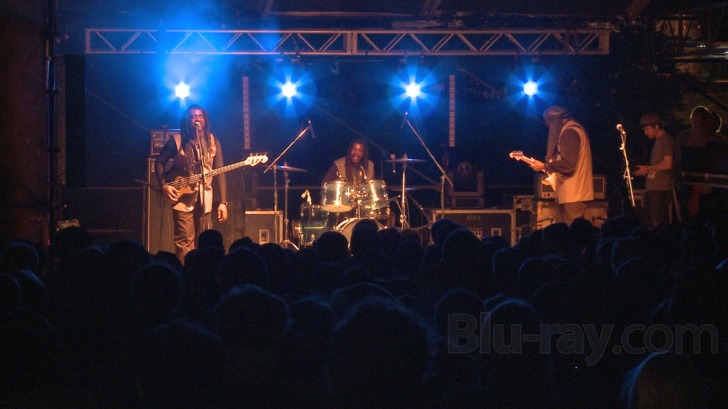
Ever since A Band Called Death appeared, some fans of the Orlando, Florida metal band of the same name founded by the late Chuck Schuldiner have taken offense that another band called itself "Death" twelve years earlier. Aside from the simple historical fact that the Hackneys were there first, the reaction is unwarranted. Schuldiner's band ended with his tragic death in 2001, some years before the Detroit band's renaissance. The two bands occupy different musical territories, and there's no possibility that their sounds or styles could ever be confused. Besides, as the documentary by Howlett and Covino demonstrates, the Hackneys' band name has a specific emotional gravity for the members of their family. Their founder chose it and sacrificed everything to retain it, because to him it signified the continuity of spiritual existence. (He sometimes referred to this world as a "waiting room".) David Hackney's brothers waited thirty-five years to perform as a band called "Death". They've more than earned the right. Highly recommended.
Similar titles
Similar titles you might also like

Amazing Grace
Aretha Franklin
2018

The Dog
2013

Fahrenheit 9/11
2004

Helvetica
2007

The Late Great Planet Earth
1979

Filmworker
2018

RBG
2018

For the Love of Spock
2016

Elstree 1976
2015

Drunk Stoned Brilliant Dead: The Story of the National Lampoon
2015

Citizenfour
2014

Side by Side
2012

Prohibition
2011

Indie Game: The Movie
Special Edition - Limited Edition to 3000
2012

The Death of "Superman Lives": What Happened?
Kickstarter Exclusive
2015

The Great Buster: A Celebration
2018

Mankind: The Story of All of Us
2012

Big Star: Nothing Can Hurt Me
2012

Dogtown and Z-Boys
2001

Spitfire: The Plane That Saved the World
2018